Dr. Brice X. Semmens
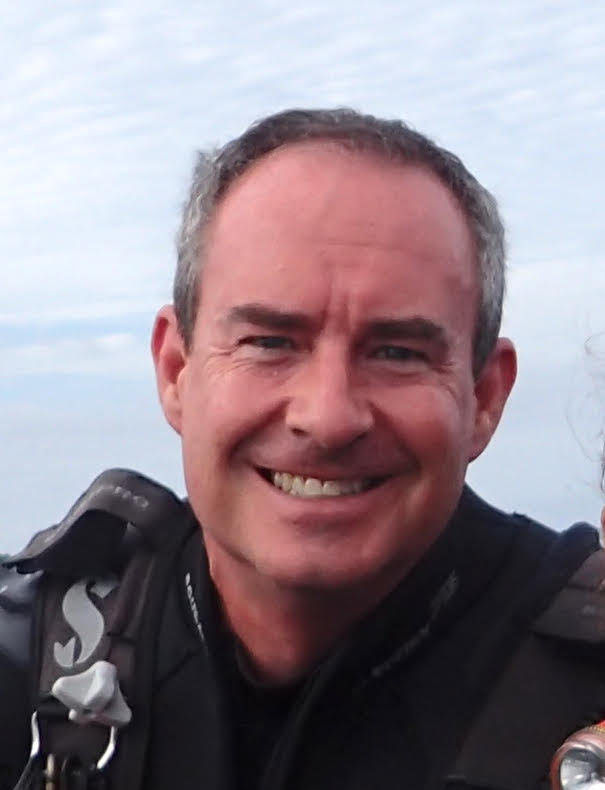
Brice Semmens is a professor in the Marine Biology Research Division at Scripps Institution of Oceanography at UC San Diego. Dr. Semmens is also the Director of the California Cooperative Oceanic Fisheries Investigations (CalCOFI) program. In the lab, he focuses on developing novel methods for analyzing ecological information. In the field, he uses advanced sampling techniques to characterize the movements and behaviors of marine animals as a function of habitat and interactions among individuals. Dr. Semmens makes use of a broad suite of analytic tools, including multi-level models, time/space series analysis, state-space model formulations, and information theoretic approaches to model selection. He has worked with data from a number of different ecosystems, including coral reef fish, Pacific salmonids, coastal gray wolves, southern resident killer whales, and coastal groundfish. He leads Grouper Moon, a multi-institution conservation project aimed at describing the spatial, demographic, and numerical impact of spawning-site marine protected areas (MPAs) on endangered Nassau grouper in the Cayman Islands.
REEF Grouper Moon
CalCOFI
Google Scholar
PhD Students
Kiirah Green
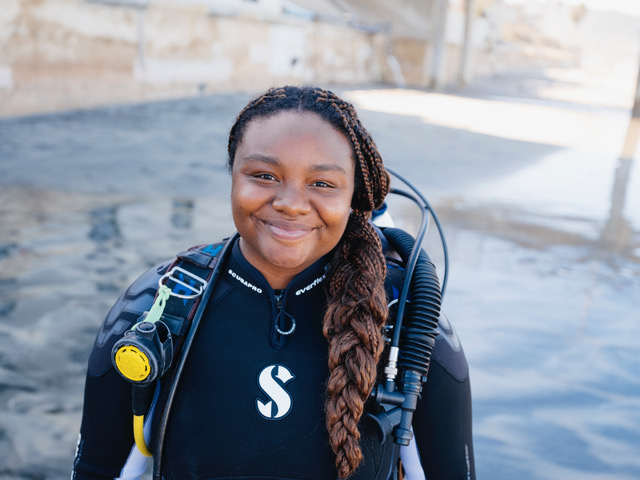
Kiirah Green is a PhD student in the Marine Biology program. Her research focuses on environmental DNA (eDNA) and computational analysis to develop tools for assessing high-priority species and ecosystems within the Channel Islands National Marine Sanctuary. A passionate explorer of the deep sea, Kiirah is working on utilizing eDNA to support marine conservation efforts and restoration projects.
Theodora Mautz
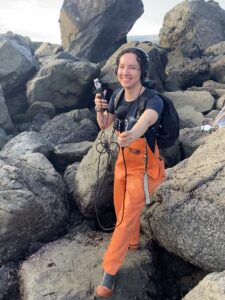
Theodora is a PhD student in the Marine Biology program. She graduated from Harvard University in 2019 with a degree in Neuroscience on the Mind, Brain, and Behavior track. Prior to starting at SIO, Theodora researched chronic reproductive pain conditions in New York, created marine science multimedia as a science communication intern at Point Reyes National Seashore, and studied cephalopod neuroethology as a research intern at Okinawa Institute of Science and Technology. Theodora is interested in sensory ecology as it relates to reproductive behavior and mate choice in marine species.
Max Titcomb
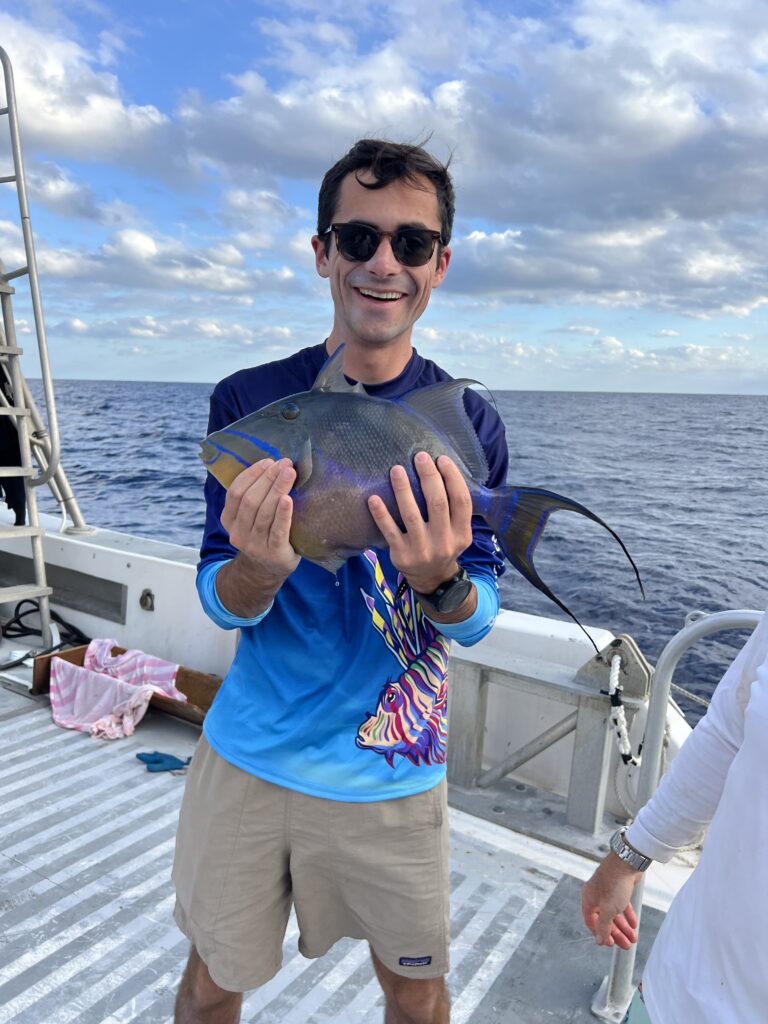
Max is a PhD student at SIO’s Marine Biology Program, working on topics within fisheries management, historical ecology, and conservation biology. He joined the Semmens Lab in 2022 after earning his B.S. in Molecular Environmental Biology and a minor in GIS from UC Berkeley. His research focuses on using statistical tools and historical records to understand long-term changes in marine population dynamics and ecosystems. His key projects involve: (1) using citizen science data and spatiotemporal modeling approaches to reconstruct population dynamics of Caribbean grouper and shark species over three decades and (2) examining sedimentary eDNA from anoxic waters in the Santa Barbara Basin to understand how small pelagic fish and plankton prey assemblages have covaried over the last two millennia.
Toni Sleugh
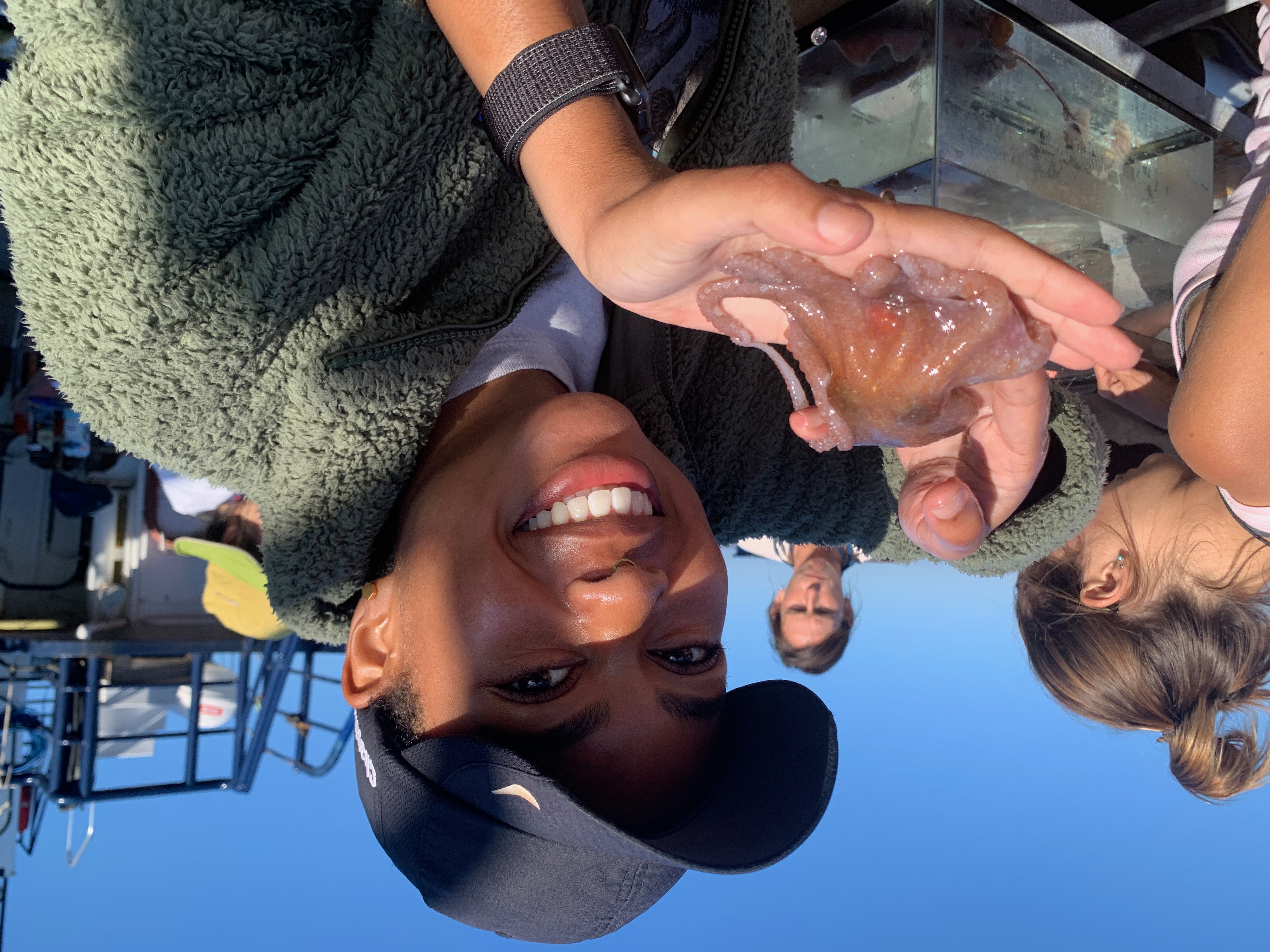
Toni is a PhD student in the Marine Biology program. She graduated from Iowa State University in 2021 with a degree in biology and environmental studies and a minor in political science. Toni is interested in the intersections between biology & social sciences, especially in ways to design sustainable resource management strategies that benefit both the ecosystem and the people that depend on it. She is currently studying spatial ecology and migratory behavior of Tiger Grouper in the Cayman Islands using acoustic tagging data collected through the Grouper Moon Project.
Jack Elstner
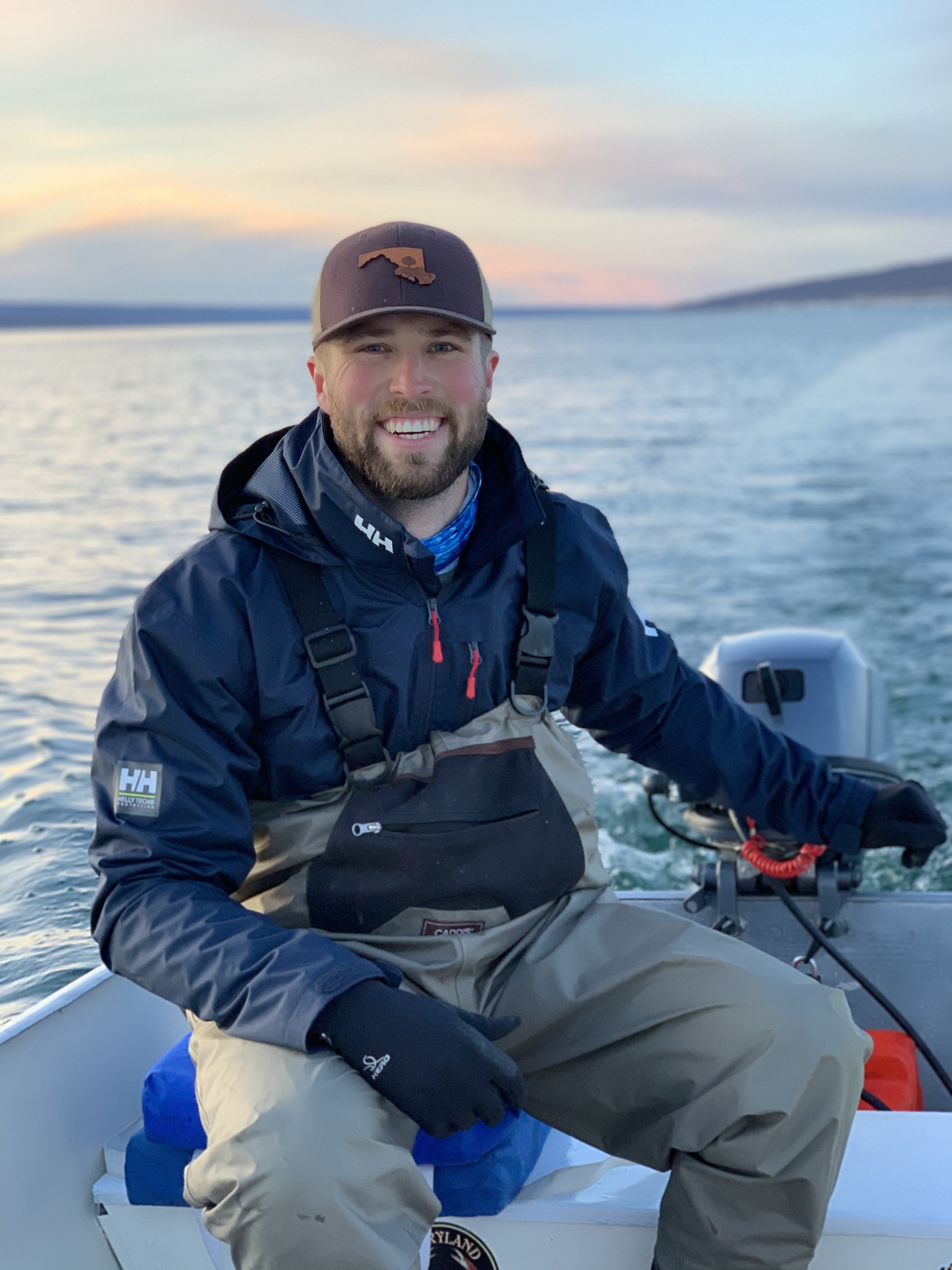
Jack is a PhD student in the Biological Oceanography program. Originally from Maryland’s Chesapeake Bay, he is interested in the conservation and management of critical marine habitats. Jack currently leads the San Diego sector of the California Collaborative Fisheries Research Program (CCFRP), a long-term fisheries monitoring program dedicated to evaluating the performance of California’s statewide network of marine protected areas (MPAs). Using CCFRP data, Jack is working to develop novel metrics of MPA performance that improve our understanding of how fish communities respond to MPA establishment. Jack is also interested the ecological role that nurseries play in marine environments, and has teamed up with the CSULB Shark Lab to study the growing number of juvenile white sharks in Southern California. This collaboration has resulted in the establishment of a large acoustic tracking network in San Diego, allowing our team to define shark activity centers, highlight critical nursery habitats, and understand how sharks move throughout and interact with local ecosystems. Jack is using the resulting acoustic telemetry datasets to construct fine-scale models of shark movement, behavior, and habitat use, with hopes of improving our understanding of shark-environment interactions that ultimately underpin the dynamics of nursery site selection.
Master’s Students
Sarah Callahan
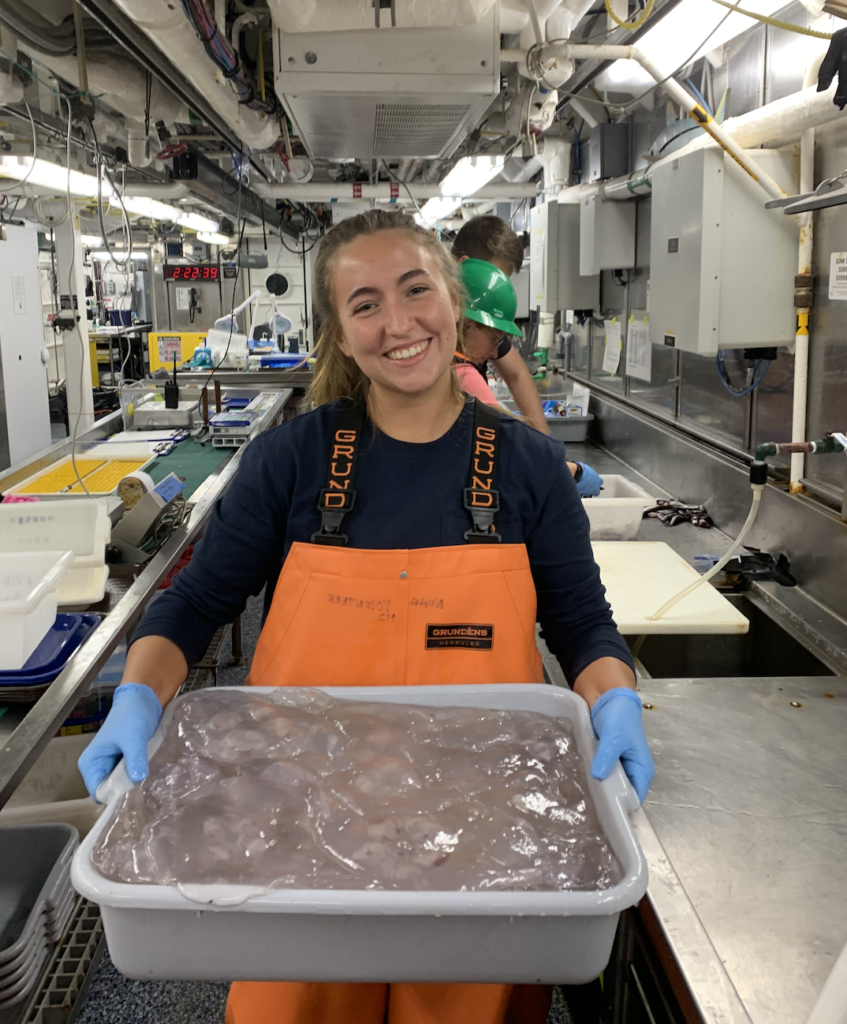
Sarah Callahan is a Master’s student in the BS/MS Marine Biology program at Scripps. She graduated from UCSD with a BS in marine biology in Spring 2024, with interests in fisheries management, stock assessment, and marine conservation. For her Master’s thesis, she will be utilizing Fourier Transform Near-Infrared (FT-NIR) spectrometry to analyze physiological stress markers in fish, aiming to enhance the understanding of marine organisms’ responses to environmental stressors. Her work aims to provide valuable insights into sustainable fisheries and marine conservation efforts.
Undergraduate Students
Shawn Doyle
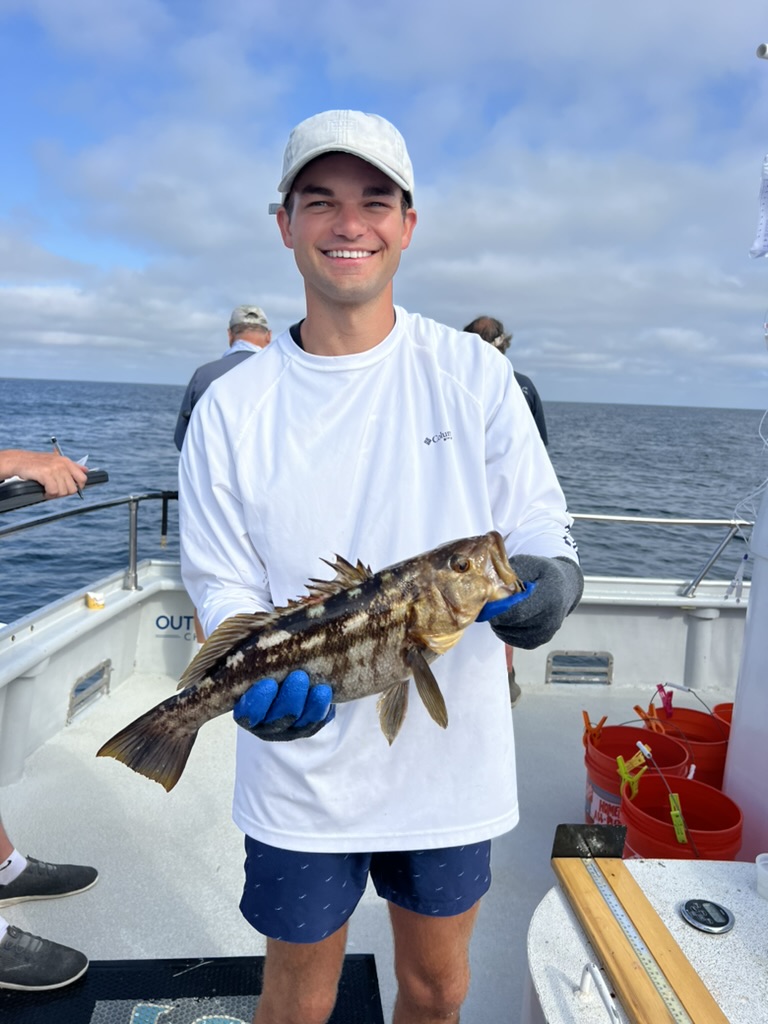
Shawn Doyle is an Undergraduate in the Marine Biology program at Scripps. He joined the lab as a Field Technician under the California Collaborative Fisheries Research Program (CCFRP), which aims to monitor marine protected areas (MPAs) along the California coast. He also works on identifying pollutants, such as DDT, in Southern California fishes. Shawn is planning on graduating with a BS in Marine Biology in June 2025 and hopes to continue his education into a graduate program with a focus in fisheries biology and marine genetics.
Grace Turner

Grace Turner is an undergraduate student at UCSD studying Marine Biology. She assists with DDT-related projects, which aim to quantify the pollutant DDT in Southern California’s fishes. Additionally, in the summer, she is a field technician for the California Collaborative Fisheries Research Project, where she helps to monitor MPA performance along the San Diego coast. Grace hopes to pursue fisheries science or cephalopod research after she graduates to further her knowledge in Marine Biology.
Postdoctoral & Visiting Scholars
Dr. Brendan Talwar (Postdoctoral Scholar)
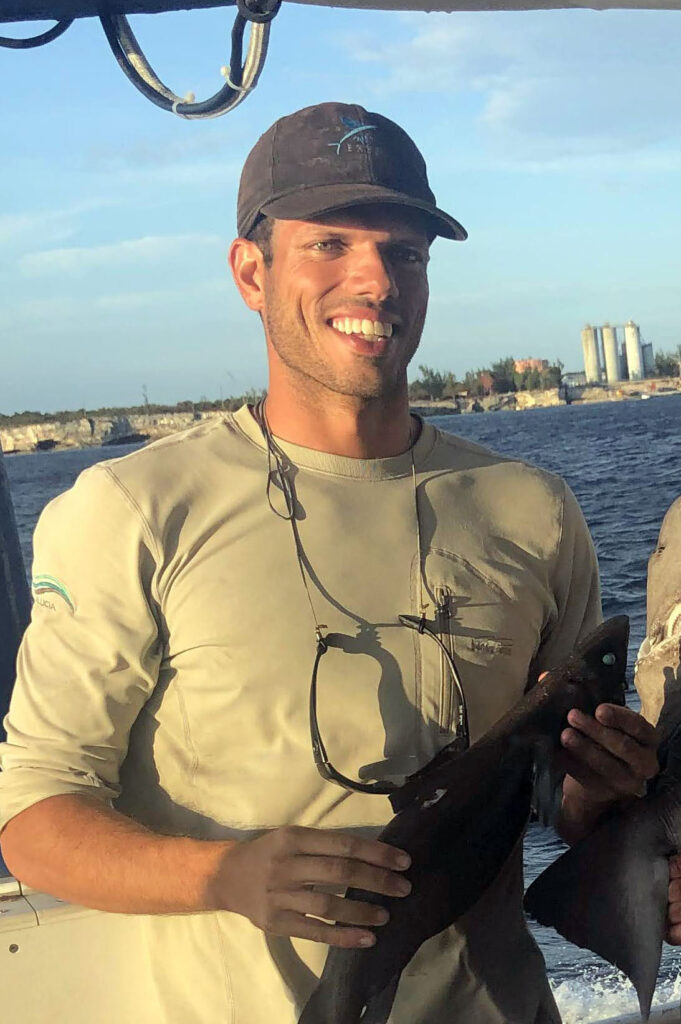
Brendan joined the Semmens Lab in 2022 as a jointly funded Postdoc through Scripps and The Nature Conservancy to conduct research on elasmobranch bycatch in the Pacific Ocean. Through close collaboration with the Inter-American Tropical Tuna Commission, he developed a conceptual model of silky shark population structure in the Eastern Pacific. In his current Postdoctoral position, he focuses on characterizing the fate and movement of legacy pollutants, such as DDT, in commercially important marine fishes of the Southern California Bight. Brendan maintains active interests in fisheries bycatch and shark ecology and has ongoing research projects in The Bahamas and elsewhere. Brendan is also a member of the IUCN Shark Specialist Group.
Dr. Lillian McGill (Postdoctoral Scholar)

Lily joined as a postdoc in the Semmens and Petrik research groups in 2022. Her current research at SIO seeks to model the fate and transport of pollutants from the recently rediscovered San Pedro Basin barrel field though the California pelagic food web using archived data from the CalCOFI ecosystem monitoring program. Her overarching research interest is in harnessing quantitative methods to address management relevant questions in both freshwater and marine science.
Dr. Lyall Bellquist (Visiting Scholar)
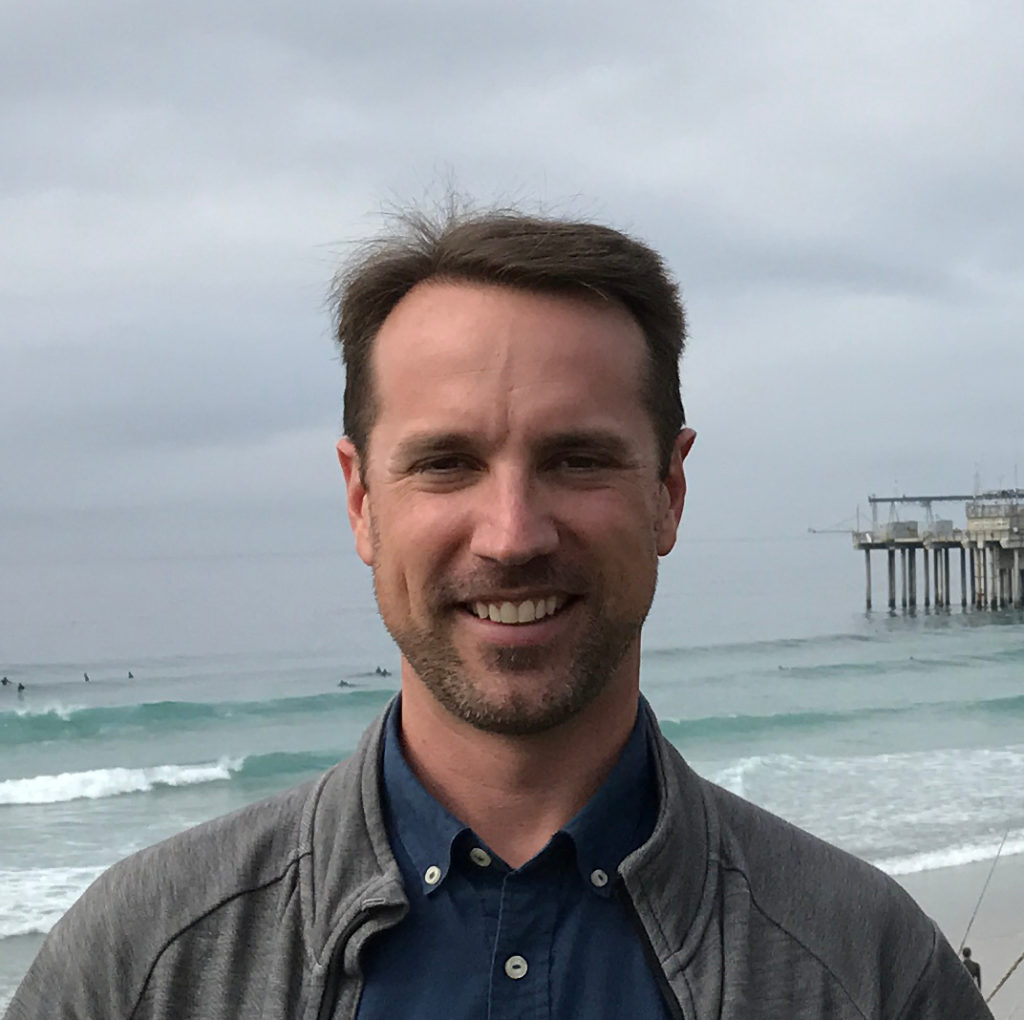
Lyall is a Fisheries Scientist with The Nature Conservancy, California Oceans Program, and is based at Scripps Institution of Oceanography as a Visiting Scholar. Prior to working for the Conservancy, Lyall completed a B.S. in Aquatic Biology at the University of California Santa Barbara, M.S. in Biology at CSU Long Beach, a Ph.D. in Marine Biology at Scripps Institution of Oceanography, and a National Research Council Postdoctoral Fellowship at the NOAA Southwest Fisheries Science Center in La Jolla, California. Lyall’s research with TNC focuses on the application of climate-ready fisheries management models to improve long-term health of ocean ecosystems, fisheries, and fishing communities, particularly in the context of extreme environmental events as a function of climate change. In collaboration with researchers at SIO, NOAA, and CDFW, Lyall is currently leading several projects, including 1) national and regional syntheses of Federal Fishery Disasters in the US, 2) a collaborative assessment of climate change-induced impacts to west coast fisheries ranging from Mexico to Alaska, 3) a nationwide assessment of federal Exempted Fishing Permits as tools for adaptive fisheries management, 4) a management strategy evaluation to minimize whale entanglements in the California commercial Dungeness crab fishery, and 5) multiple projects focusing on length-based assessments of data-limited fisheries in developed and developing countries.
Dr. Bellquist’s Google Scholar Page and The Nature Conservancy
Past Lab Members
Previous Post-docs
Dr. Peter Kuriyama
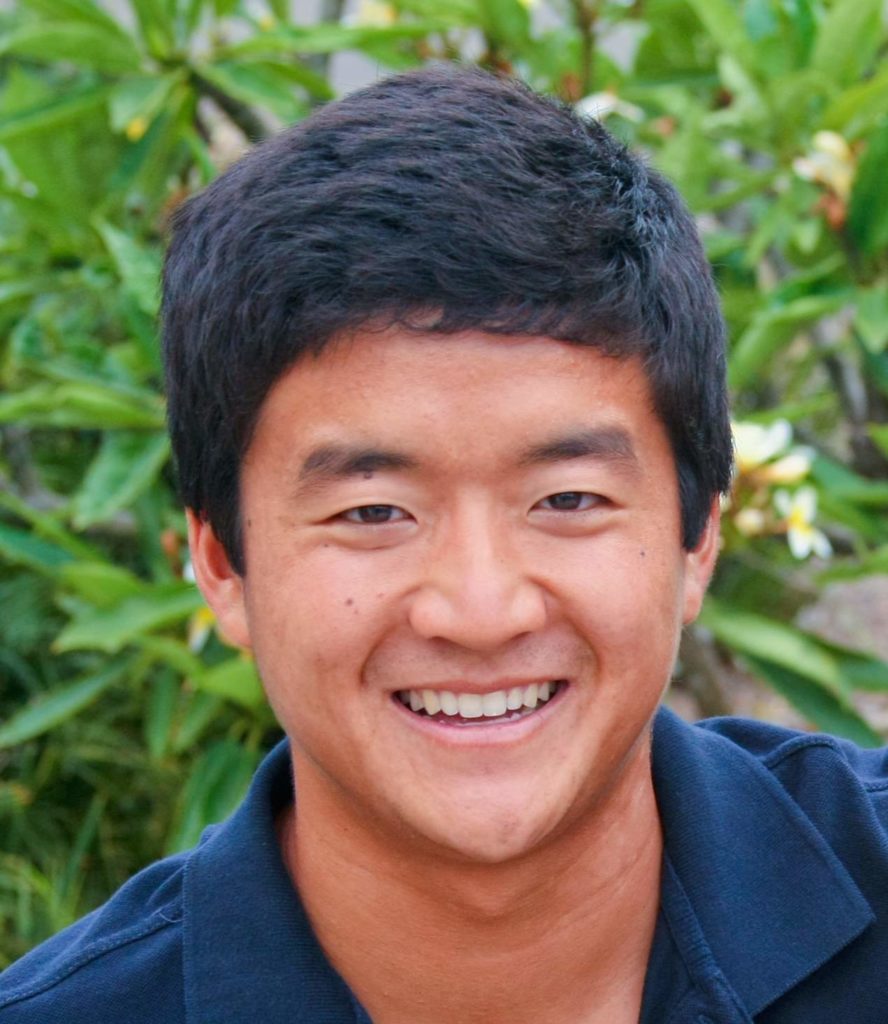
Dr. Kuriyama’s postdoctoral research was focused on applying empirical dynamic modeling to the CalCOFI survey data. Specifically, he focused on identifying spatial relationships in the California Current and exploring means of leveraging these relationships to improve predictions. He now does stock assessments at the NOAA Southwest Fisheries Science Center.
Dr. Kuriyama’s Google Scholar Page
Dr. Natalya Gallo
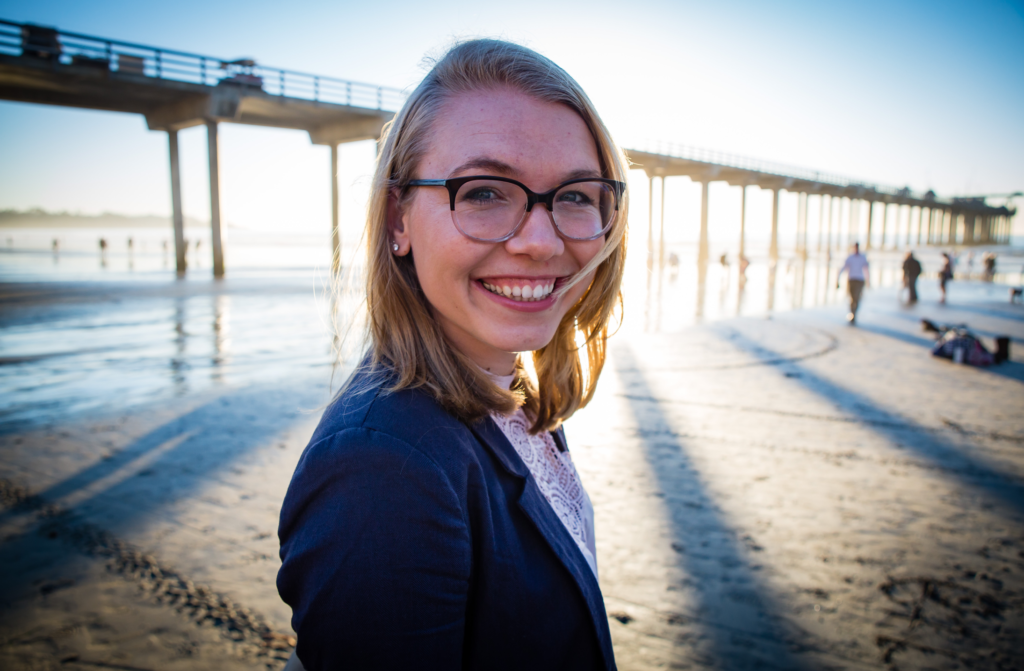
Dr. Natalya Gallo received her M.S. and Ph.D. degrees from the Scripps Institution of Oceanography and a B.S. in Ecology and Evolution from the University of Maryland. Her Ph.D. research focused on how ocean deoxygenation affects deep sea fish community ecology, with a focus on oxygen minimum zones and eastern boundary upwelling systems. After receiving her Ph.D., she joined the Semmens lab as a quantitative fisheries and ecology postdoc working with the CalCOFI ecosystem monitoring program at Scripps and the NOAA Southwest Fisheries Science Center. Her overarching interest is in how climate change impacts fish communities and fisheries and how scientific research can support sustainable ocean management and development. She is now working as a postdoctoral researcher in the Department of Biological Sciences at the University of Bergen studying hypoxia impacts on deep sea fish communities in Norwegian fjords.
Dr. Gallo’s Google Scholar Page
Dr. Daniel Greenburg
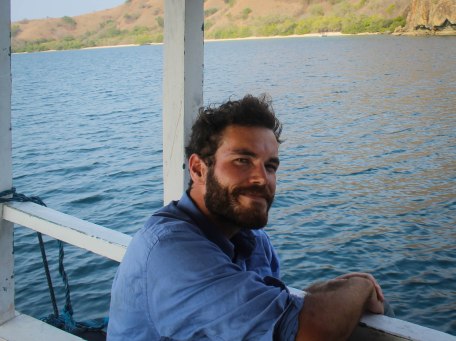
Dr. Dan Greenberg was a postdoctoral researcher in the Semmens Lab working with citizen science fish surveys from the Reef Environmental Education Foundation to understand ongoing biodiversity change in our oceans. His projects included analyzing nearly three decades of reef fish population trends in the Caribbean from these surveys, and comparing these inferences with concurrently operating systematic monitoring programs. His major research interests are in understanding how species’ evolutionary pasts contribute to their present circumstances in the Anthropocene.
Dr. Greenburg’s Google Scholar Page
Dr. Darren Johnson
Under construction
Dr. Charlotte Boyd
Under construction
Previous PhD Students
Dr. Jordan Dinardo

Jordan defended her PhD in the Marine Biology Program in 2024. Jordan is interested in applying quantitative tools to advance our understanding and management of fisheries. She began working in the Semmens Lab in 2016 as a master’s student, culminating in the development of habitat models to inform Federal Government outplanting efforts of white abalone in the Southern California Bight ecosystem. For her PhD research, Jordan expanded her quantitative skills to understand temporal and spatial dynamics of highly migratory species and coral reef fish assemblages, including Pacific Bluefin Tuna in the Eastern Pacific Ocean (EPO), parrotfish species in the Caribbean, and bycatch species associated with purse seine fisheries in the EPO. Stemming from her collaborative research with industry she is also interested in the social aspects of seafood sustainability and investigated how consumer knowledge impacts the expectations of ecolabeling at both the industry and certification body (i.e., Marine Stewardship Council) levels.
Dr. Erica Mason
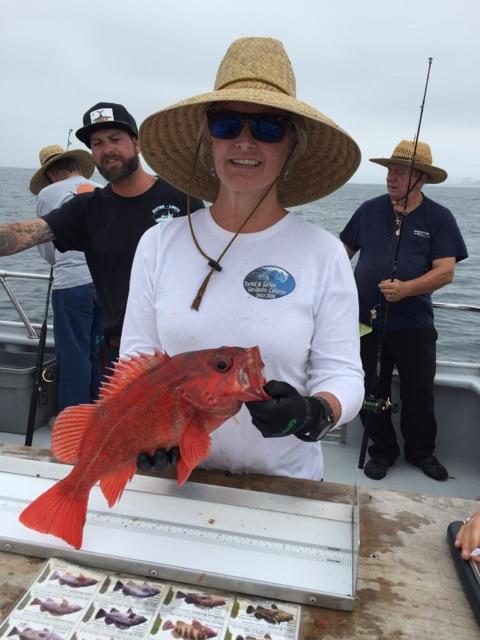
Erica defended her PhD in the Marine Biology program after coming to the Semmens Lab with a Master of Science degree in Biology from California State University, Long Beach, several years of professional working experience, a husband, and a just-turned three-year old son! The focus of her dissertation was a natural extension of the research she conducted as a former scientist with the California Department of Fish and Wildlife (CDFW) with intentions to beef up her quantitative toolbox. The bulk of her dissertation was funded with a grant through California’s Ocean Protection Council. With a combination of modern quantitative and analytical methods (e.g., tag and recapture modeling using bayesian statistical methods, morphological and molecular identifications of larval fish, species distribution modeling, and compound-specific stable isotope analysis of amino acids), her thesis unraveled mechanisms driving pattern and process in the population dynamics of the iconic saltwater bass fishery in southern California. The bulk of her research relied on larval and oceanographic samples collected by the California Cooperative Oceanic Fisheries Investigations (CalCOFI) monitoring efforts. Erica also helped the Semmens Lab lead the California Collaborative Fisheries Research Program out of San Diego, CA and was a QUEST (Quantitative Ecology and Socioeconomics Training) fellow with NOAA’s Southwest Fisheries Science Center. Erica is a member of the southern California, Baja California Mexico District of the American Institute of Fishery Research Biologists (AIFRB) — check out her profile on their Young Professionals spotlight here. Erica’s personal website and GitHub repositories can be found here.
Dr. Lynn Waterhouse
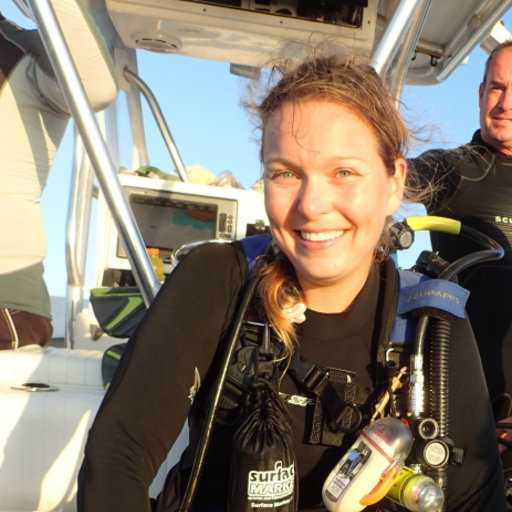
Dr. Waterhouse defended her PhD in Biological Oceanography at Scripps Institution of Oceanography in December 2018. She then took a full-time position as a Research Biologist with the John G. Shedd Aquarium in Chicago, IL where her focus is on mesopredators in The Bahamas and teaching a marine ecology course to undergraduates . Her work currently focuses on updating the assessment of Nassau grouper for The Bahamas and working on growth studies of Tropical Tunas in the Atlantic Ocean (Bigeye, Yellowfin, and Skipjack). While at SIO Lynn worked on estimating abundance through time of Nassau grouper in the Cayman Islands, completed a stock assessment of white seabass for the State of California with Dr. Juan Valero (CAPAM), estimated returns to natal streams using PIT tag data for steelhead in the Pacific Northwest, and worked on selectivity curves (particularly when they take on weird shapes). Lynn was also active with Women and Minorities in Sciences (WMIS) at SIO, UCSD Graduate Student Advisory council, R-users group at SIO, a volunteer diver with Birch Aquarium at Scripps, and worked with the Equity, Diversity, and Inclusion office at SIO with Keiara Auzenne, Director of Diversity Initiatives at Scripps Institution of Oceanography.
Dr. Waterhouse’s Google Scholar Page and CAPAM
Dr. Kayla Blincow
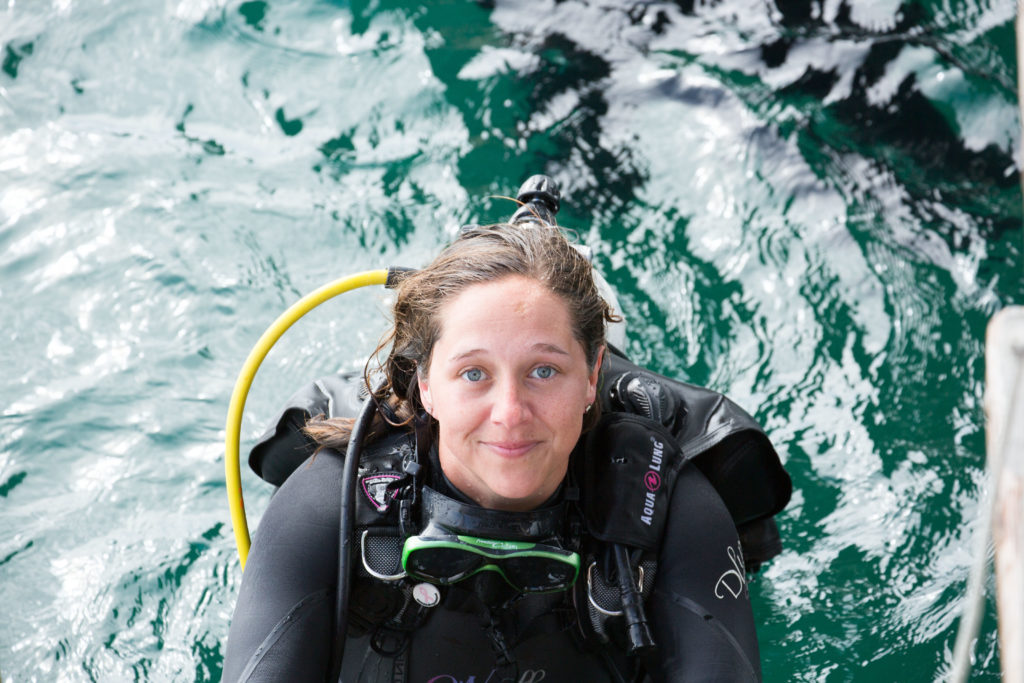
Kayla Blincow was a PhD Candidate in the Semmens Lab working broadly on fisheries ecology, often combining field methods with quantitative tools. In her thesis work she explored social, ecological, and economic aspects of fisheries at species, fishery, and global scales. At the species level she investigated the trophic and spatial ecology of Critically Endangered Giant Sea Bass. At the fishery level she explored species landings networks from the Southern California Commercial Passenger Fishing Vessel fleet. And at the global level she characterized responses of the global seafood trade network to perturbations. Kayla was also responsible for operating and maintaining the lab’s small research vessel, the R/V Red Rackham, and the local La Jolla Acoustic Array comprising ~30 acoustic receivers spanning the La Jolla Kelp Forest, two marine reserves, and a highly trafficked recreational fishing area.
Kayla Blincow’s Google Scholar Page
Dr. Josh Stewart
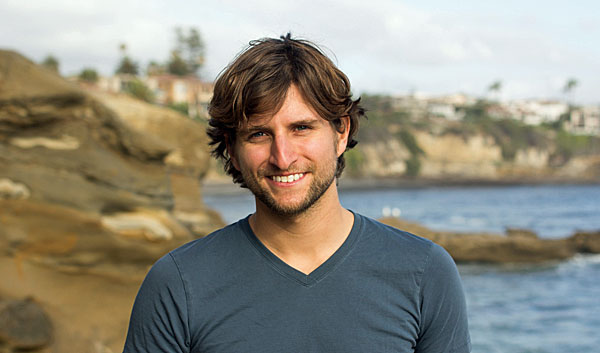
Dr. Stewart is a quantitative conservation ecologist, specializing in large marine vertebrates. He is especially interested in finding better ways to protect mobile and migratory species and support management decisions with quantitative science. He received his Ph.D. from Scripps Institution of Oceanography in San Diego, and has been an Associate Director of The Manta Trust since its inception in 2011. Josh was later a postdoctoral research fellow in NOAA’s Cetacean Health and Life History Program, where he combined technology and quantitative approaches to improve our understanding of cetacean population dynamics. He is now an Assistant Professor at the Oregon State University Marine Mammal Institute.
Dr. Stewart’s Website and Dr. Stewart’s Lab
Dr. Noah Ben-Aderet
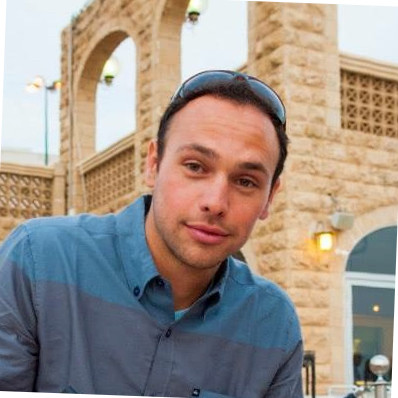
Dr. Ben-Aderet graduated with a PhD in Marine Biology. His dissertation work focused on the Yellowtail Jack in the Southern California Bight, including aspects of its movements, trophic ecology, and fisheries interactions, while maintaining the La Jolla Acoustic Array and collaborating broadly on fish movements in the region. He was also a NOAA Knauss Fellow and worked as a Senior Environmental Scientist for the California Department of Fish and Wildlife after graduating. He is now with the California Office of Spill Prevention and Response.
Previous Master’s Students
Lucy Bulkeley

Lucy graduated with a Bachelor’s Degree in Marine Biology in Fall 2023 and a Master’s Degree in Marine Biology in Summer 2024. She began working in the Semmens lab in 2019 where she assisted on work using CalCOFI samples to identify Paralabrax larvae using a combination of molecular and morphological techniques in order to illuminate their population dynamics within the Southern California Bight. She then turned that work into a Master’s thesis.
Connor Coscino
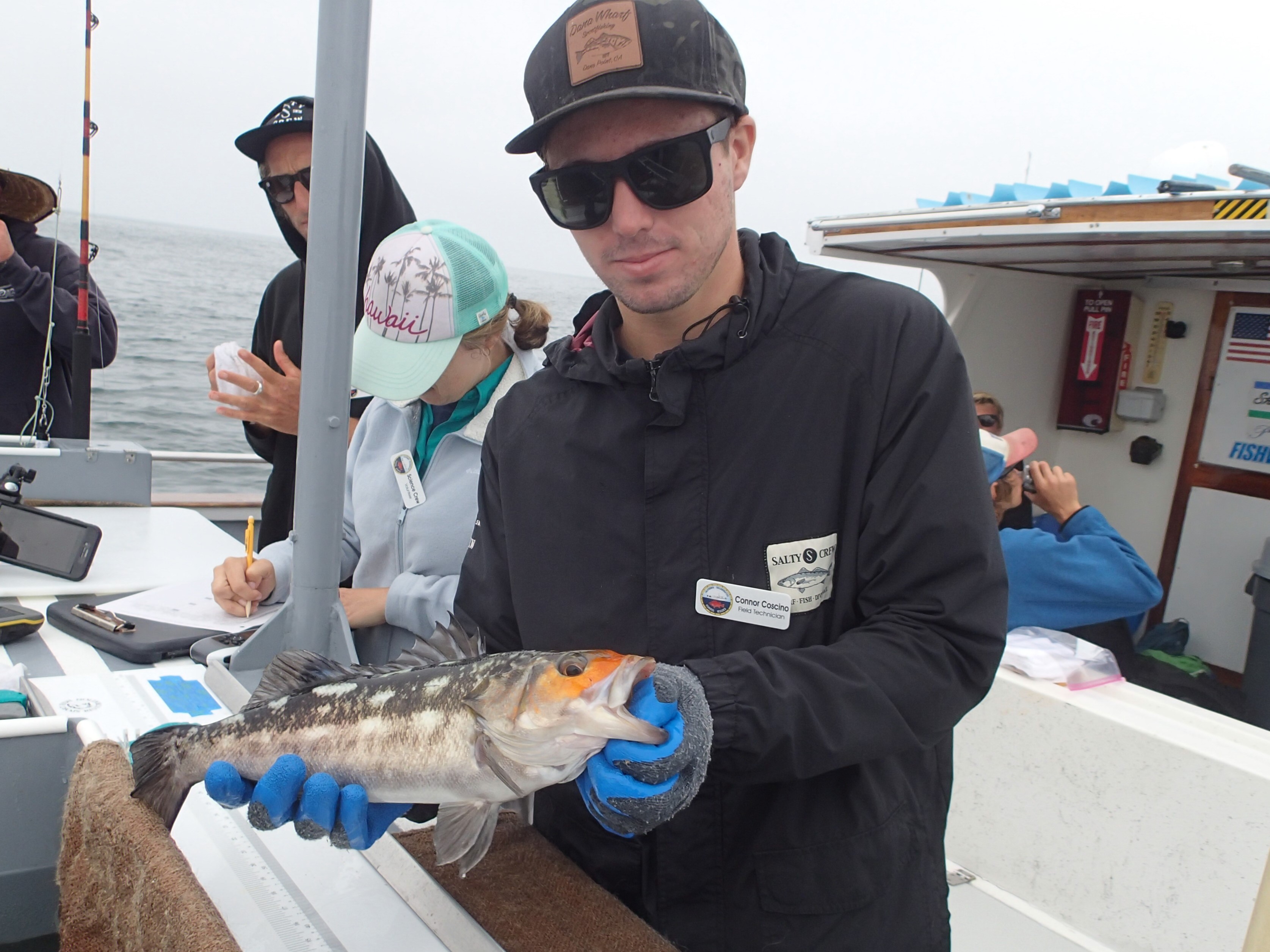
Connor Coscino graduated with a Master of Science in March 2023. His research focused on using quantitative length-based methods to assess data-limited fisheries and evaluate minimum size limits. As an undergraduate student in the Semmens Lab, he led field research for the California Collaborative Fisheries Research Program (CCFRP) in efforts to evaluate Marine Protected Areas (MPAs). Currently, he works as an environmental scientist for CDFW.
Kamran Walsh
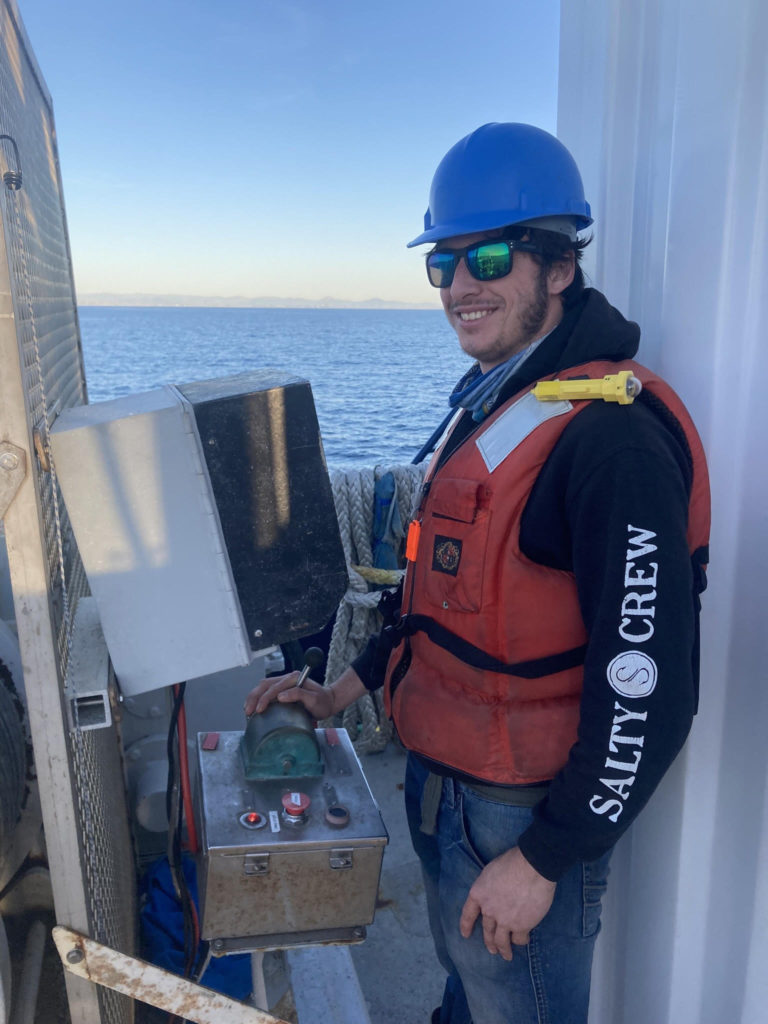
Kamran Walsh defended his Master’s in the BS/MS program at SIO, graduating with a Bachelor’s Degree in Marine Biology in Fall 2021 and a Master’s Degree in Marine Biology in Spring 2022. He began working in the Semmens Lab in 2021, conducting microscopy for a NSF RAPID project evaluating the trophic mechanisms responsible for northern anchovy boom and bust cycles in the California Current. For his Master’s, he studied the feeding ecology of larval rockfishes in the Southern California Bight and determined how larval diet affects recruitment success.
Cameron Van-horn
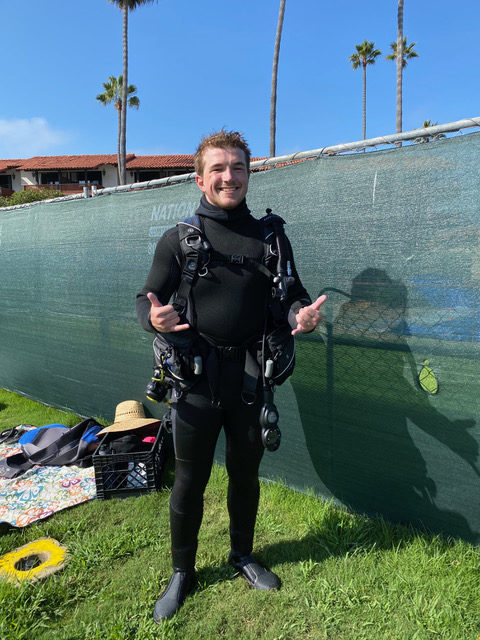
Cameron was a Master’s student in the BS/MS program at Scripps, graduating with a Bachelor’s degree in Marine Biology from UCSD in Spring 2020. He began working in the Semmens Lab late in 2019, where he analyzed video data to help build a database of Grouper “fish faces” for identification across years and locations. For his Masters, Cameron investigated bioacoustics of groupers in the Cayman Islands. He used their courtship associated sounds (CAS) to better understand their movement and aggregation patterns. To accomplish this, he worked with a deep learning ML algorithm to extract the CAS from millions of sound files from 2013 to 2020.
Jessica Freeman
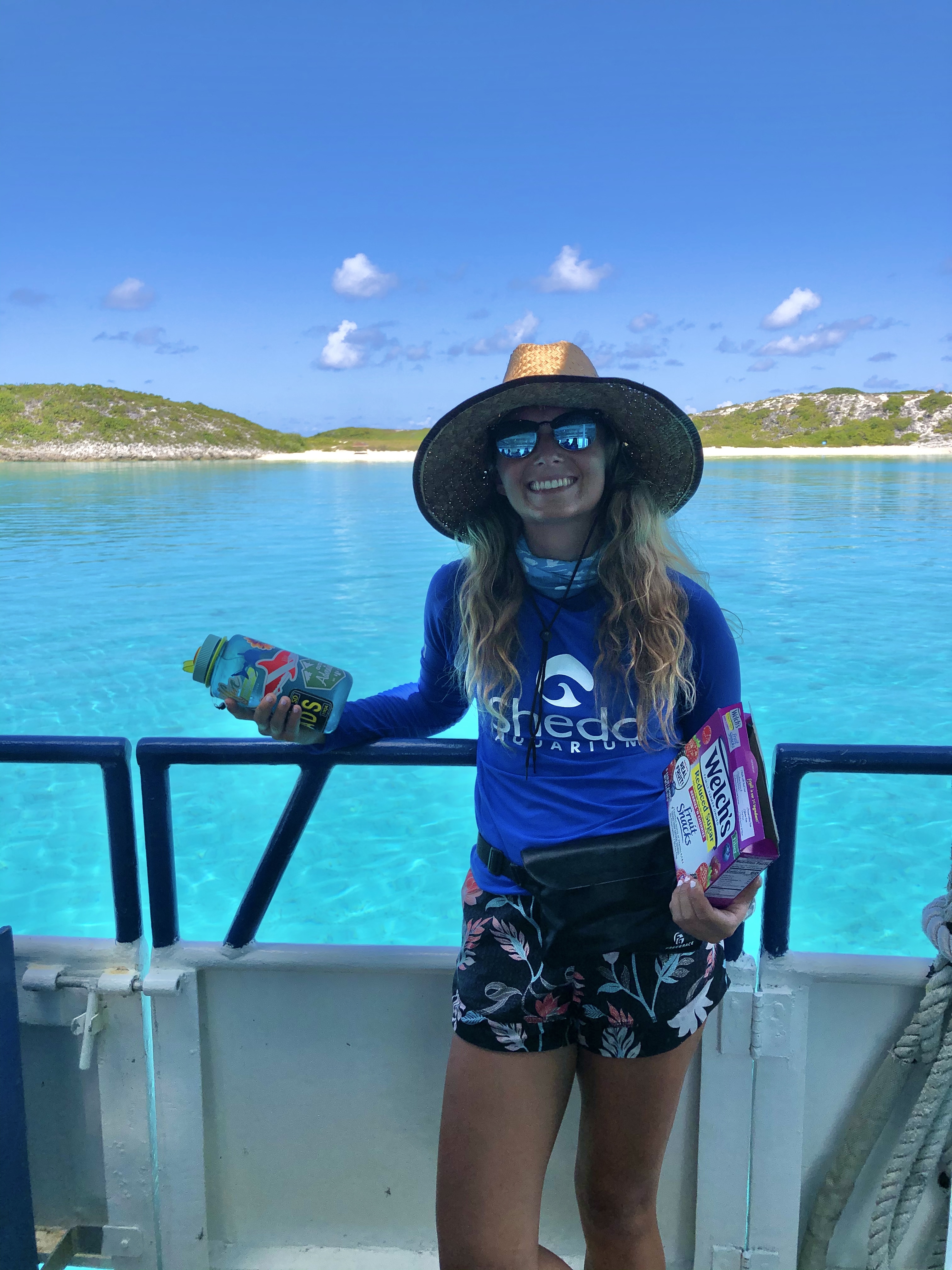
Jessica was a Master’s student in the BS/MS contiguous program at Scripps Institution of Oceanography, and graduated in 2019 with a BS studying marine biology. She began working in the Semmens Lab studying marine fisheries, and was doing work involving the biodiversity and community structure of rockfishes in the Southern California Bight. Using data from the California Cooperative Oceanic Fisheries Investigations (CalCOFI), Jessica was analyzing a larval time series to understand the effects of conservation areas and environmental conditions on rockfish population dynamics.
Previous Undergraduate Students
Summer 2020
Charles Hendrickson – Undergraduate student at UC Santa Cruz and part of SURF 2020. Charles used specialized software to measure the lengths of Nassau grouper in video taken during Grouper Moon. He subsequently analyzed these data to look for differences in length frequency throughout the spawning season.
Elizabeth Nguyen – Elizabeth was a high school student and an American Fisheries Society Hutton Junior Fisheries Biology Scholar working on recreational fisheries issues.
Sebastian Sanchez – Sebastian was a high school student and an American Fisheries Society Hutton Junior Fisheries Biology Scholar working on recreational fisheries issues.
2018 and 2019
India Dove – India was a UCSD undergraduate working with the Grouper Moon research program to measure grouper egg fertilization rates as well as capture egg morphometric data.
Summer 2018
Joseph Molina – Joseph was a non-UCSD undergraduate and a 2018 SURF student working on Grouper Moon video analysis, and helping with the local marine fieldwork.
Mary Cozy – Mary was a non-UCSD undergraduate and a 2018 SURF student working on Grouper Moon video analysis, and helping with the local marine fieldwork.
Summer 2017
Kayla Martinez-Soto – Kayla was a non-UCSD undergraduate and a 2017 SURF student who worked on egg morphometrics and fertilization rates of Nassau grouper and Tiger grouper in the Cayman Islands.
Sidrah Albahsahli – Sidrah was a paid high school intern who was assigned through the Summer Institute for Life Sciences.
Summer 2016
Brian Cohn – Brian was a non-UCSD undergraduate analyzing video data captured during fieldwork on a Nassau grouper spawning aggregation. Brian was an NSF REU through the Scripps Undergraduate Research Fellowship (SURF) at the Scripps Institution of Oceanography (UC San Diego).
Lauren Arnold – Lauren was a non-UCSD undergraduate helping graduate student Brian Stock sort and categorize plankton samples associated with a spawn cloud of Nassau grouper eggs. Lauren was on a fellowship through “The Ocean as a Bridge to Enhance Participation in the Sciences”, a summer research/training program sponsored by UCOP to link UC campuses with undergraduates from Historically Black Universities and Colleges (HBCUs) for Summer 2016.
Trish Lai – Trish was a paid high school intern assigned through the Summer Institute for Life Sciences. She worked to digitize old landing documents from Nassau grouper in the Cayman Islands.
Summer 2015
Jarvon Stout – Jarvon was a non-UCSD undergraduate who worked on the development of computer-aided pattern matching of the Nassau Grouper for individual recognition. Jarvon was on fellowship through “The Ocean as a Bridge to Enhance Participation in the Sciences”, a summer research/training program sponsored by UCOP to link UC campuses with undergraduates from Historically Black Universities and Colleges (HBCUs) for Summer 2015.
Patricia Villalobos – Patricia was a non-UCSD undergraduate who helped analyze length-frequency data from video data from a Nassau grouper spawning aggregation in the Cayman Islands. Patricia was awarded a 2015 fellowship through the Summer Training Academy for Research Success (STARS), a program designed to provide under-represented, Ph.D.- bound students with research experience.
Bethany Fowler – Bethany was a non-UCSD undergraduate who analyzed passive acoustic monitoring data from a grouper spawning site in the Cayman Islands. Bethany was an NSF REU through the Scripps Undergraduate Research Fellowship (SURF) at the Scripps Institution of Oceanography (UC San Diego) for Summer 2015.
Summer 2013 and 2014
McLean Sammon – McLean was a volunteer who helped in lab with counting fertilization rates, REEF tasks, and then compiling life history information for various fish species from FishBase during the Summer of 2013 and 2014.
